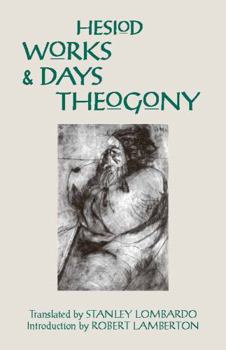Θεογονία / Ἔργα καὶ Ἡμέραι
Select Format
Select Condition 
Book Overview
Customer Reviews
Rated 5 starsBest translation available
I must have compared a number of different Hesiod translation before finding Stanley Lombardo's! At once I felt at peace with my searching struggle and was extremely happy with his version! He has presented the "Theogony" and "Works & Days" in a way that makes for easy and pleasurable reading, with a realistic power and a believability in Hesiod himself. Not only that but he has taken the time to seperated each text into...
1Report
Rated 4 starsWords of Wisdom from an Everyday Rustic
Hesiod's Theogony was the best known poem in antiquity and the single greatest summary of the Greek gods and the theological tradition of Archaic Greece (800-480 B.C.) Its origins are based in oral tradition and the poem itself is structured in run-composition with framed episodes that use repetitious formulas. Due to its structure, the narrative can shift suddenly from one topic to another, thus leading to inconsistencies...
1Report
Rated 5 starsIan Myles Slater on: West's Hesiod Translation
Some of the other reviews offered with M.L. West's translation of Hesiod's "Theogony" and "Works and Days" for the Oxford World's Classics actually refer to Dorothea Wender's verse translation of the same works, plus a charming version of the collection of lyrics attributed to Theognis, published in the Penguin Classics. That is a worthwhile version -- although the joining of the peasant-oriented Boeotian Hesiod to the mainly...
1Report
Rated 5 starsOne of the best Classical translations I have ever read
Penguin translations often go too far in pursuit of a contemporary and popular sound, for instance in the infamous Rieu translations of Homer, with Athena "dancing attendance on Odysseus like a lover"; but this one is perfect, probably the best of the entire Penguin Classics collection. The jewel in this excellent book is the translation of Hesiod's WORKS AND DAYS; a translation of exceptional quality, worthy of being mentioned...
1Report
Rated 5 starsStandard reading
Hesiod is thought to have lived about the same time as Homer. In his "Theogony" he offers perhaps the most detailed Grecian creation myth still in existence. It traces the emergence of Gaia, her marriage to Ouranos, the fatherly castrations (Kronos / Ouranos & Zeus / Kronos), the hegemony of Zeus as well as a good bit of neurotic misogyny mixed in for good measure. The geneologies serve as a wonderful preamble for those...
1Report














